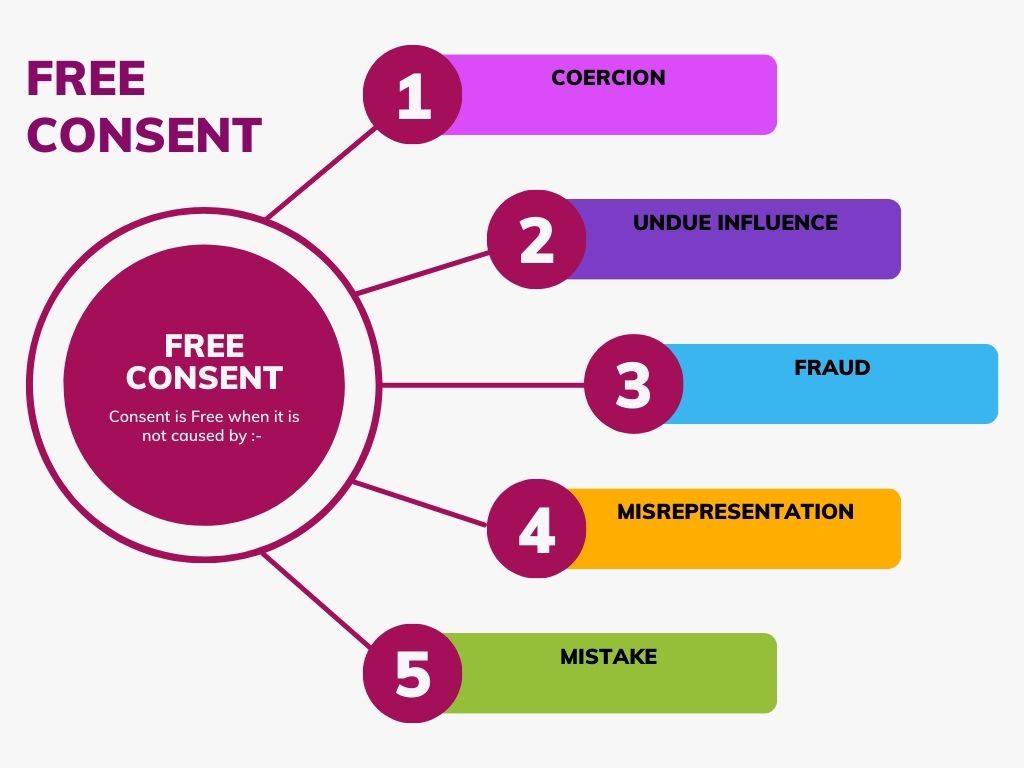
Coercion (Section 15):
- Definition: Coercion involves the use of force or threat to make a person enter into a contract against their will.
- Example: A threat to harm someone or their property if they do not agree to a contract.
Coercion is when one party to a contract compels the other party to enter into the contract by:
- Committing or threatening to commit any act forbidden by the Indian Penal Code (IPC), or
- Unlawfully detaining or threatening to detain any property, to the prejudice of any person, to compel that person to enter into a contract.
Undue Influence (Section 16): Free Consent Indian Contract Act 1872
- Definition: Undue influence exists when one party to the contract is in a position to dominate the will of the other and uses that position to obtain an unfair advantage.
- Example: A doctor pressuring a patient to sign a contract while the patient is still under the influence of anesthesia.
Elements:
- Relationship of Influence: There must exist a relationship where one party has significant influence over the other, such as a fiduciary relationship (like doctor-patient, guardian-ward) or a relationship of trust and confidence.
- Unfair Persuasion: The influencing party uses this position to persuade or manipulate the other party into entering into a contract that benefits the influencer to the detriment of the influenced party.
- Weakening of Free Will: Undue influence undermines the free will and independent judgment of the influenced party, making them vulnerable to making decisions they would not otherwise have made.
Fraud (Section 17): Free Consent Indian Contract Act 1872
- Definition: Fraud involves any act committed with the intent to deceive another party, or to induce them to enter into a contract.
- Example: Providing false information or concealing material facts to persuade someone to agree to a contract.
Elements:
- False Representation: The party committing fraud makes a false statement or conceals material facts that they know to be false.
- Intent: There must be an intention to deceive the other party or to induce them to act upon the false information.
- Reliance: The deceived party relies on the false representation and enters into the contract based on that reliance.
- Damages: The deceived party suffers damages as a result of relying on the false representation.
Types of Fraud: Free Consent Indian Contract Act 1872
- Active Fraud: Direct misrepresentation of facts, such as lying about the condition or value of goods being sold.
- Silence or Non-Disclosure: Failure to disclose material facts that one has a duty to disclose, which can also constitute fraud under certain circumstances.
- Fraudulent Intent: The intent to deceive or induce the other party to act against their own interests.
Misrepresentation (Section 18): Free Consent Indian Contract Act 1872
- Definition: Misrepresentation occurs when one party makes a false statement of fact to the other party, which induces them to enter into the contract.
- Example: Misrepresenting the quality or condition of goods being sold.
Elements :
False Statement: The misrepresentation involves a statement of fact that is untrue.
Materiality: The statement must be relevant and significant enough to influence the decision of the other party in entering into the contract.
Reliance: The deceived party relies on the false statement when deciding to enter into the contract.
Damages: The deceived party suffers harm or loss as a result of relying on the false statement.
Mistake (Section 20):
- Definition: Mistake occurs when both parties to the contract are mistaken about a fundamental aspect of the contract.
- Example: A mutual misunderstanding about the subject matter or terms of the contract.
Types of Mistake:
- Mutual Mistake: Both parties make the same mistake regarding a fundamental fact essential to the contract. This mutual misunderstanding undermines the basis of the contract.
- Unilateral Mistake: Only one party is mistaken about a fundamental fact, and the other party is aware of this mistake but does not correct it.
- Common Mistake: Both parties are mistaken about the same fundamental fact, which affects the contract’s validity.
Elements:
- Fundamental Fact: The mistake must relate to a fact or assumption that is crucial to the contract’s subject matter or performance.
- Impact on Contract: The mistake must be sufficiently serious to affect the parties’ understanding of their obligations under the contract.
- Unawareness: The parties must have been unaware of the mistake at the time the contract was formed.
Legal Consequences:
- Voidability: Contracts affected by mistake may be voidable at the option of the party adversely affected by the mistake.
- Rescission: The party suffering from the mistake can seek to rescind (cancel) the contract and potentially recover any benefits conferred under the contract.
- Exceptions: Courts may refuse to grant relief for mistake if it was due to negligence or if the risk of the mistake was assumed by the mistaken party.

